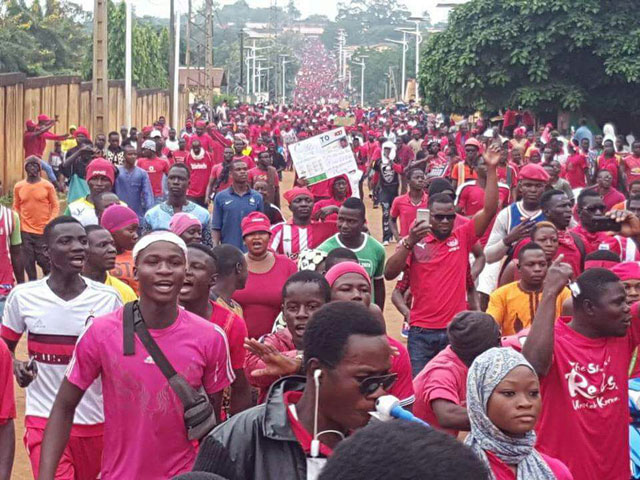
Lome, Togo | AFP | Togo’s government was surprised by how many people took to the streets earlier this month to demand the removal of President Faure Gnassingbe.
But with no end in sight to the protesters’ calls for change, questions are mounting about whether the pressure can be maintained to bring an end to his family’s 50-year rule.
Opposition leaders were quick to call the first marches this month “unprecedented”, after hundreds of thousands of people young and old turned out in force across the country.
What was also unprecedented was the united front presented by opposition parties, whose squabbling and differences in the past made them an ineffective force against the ruling regime.
“This time there’s a real window of opportunity that we mustn’t let close,” said Nathaniel Olympio, head of the Togolese Party.
– Cunning needed –
Veteran opposition leader Jean-Pierre Fabre, from the National Alliance for Change (ANC), has vowed “no let-up” in the protests until Gnassingbe steps down.
But already his words seem optimistic. With unemployment and poverty widespread across Togo, many say protesting is a luxury they can’t afford when they have mouths to feed.
Nathan, a 54-year-old carpenter, believes God has chosen Togo’s president. “Me? I’m trying to earn my crust. I don’t get involved in politics,” he told AFP.
David Dosseh, who coordinates university civil society groups in Togo, said: “It’ll be difficult to mobilise as many people over a longer period of time.
“You have to think about other ways to shut down the country, such as civil disobedience.”
Comi Toulabour, head of research at the Institute of Politics in Bordeaux, was more emphatic: “If the opposition isn’t more cunning, the government will have the upper hand.”
Fabre has organised weekly demonstrations for years. Every Saturday, his supporters march through the streets of the capital, Lome, to the beach.
“When all’s said and done, it was a picnic atmosphere,” said Toulabor. “It’s unfortunate to say it, but as long as nothing happens, the government isn’t bothered.
“Cracks have already started to reappear in the (opposition) coalition. They all know that it was (Tikpi) Atchadam who brought about the real anti-establishment protest.”
Atchadam, whom the government brands a dangerous extremist, managed to create a popular support base in northern Togo, which has historically been loyal to the Gnassingbe family.
In Bafilo, Mango and Sokode, protesters attacked police stations and set fire to houses belonging to senior members of the president’s ruling party.
At least three people have been killed and dozens more have been injured since the start of the protests as the authorities fought back.
“Only the army can tip the balance,” said Toulabor. “But its organisation is still very clannish.”
Power is kept in the family in Togo where the head of the armed forces is the president’s brother-in-law.
“This situation worries us, obviously,” a source close to the presidency conceded.
“If it hadn’t the government wouldn’t have proposed an emergency parliamentary bill (on constitutional reform). The pressure is real.”
 The Independent Uganda: You get the Truth we Pay the Price
The Independent Uganda: You get the Truth we Pay the Price



